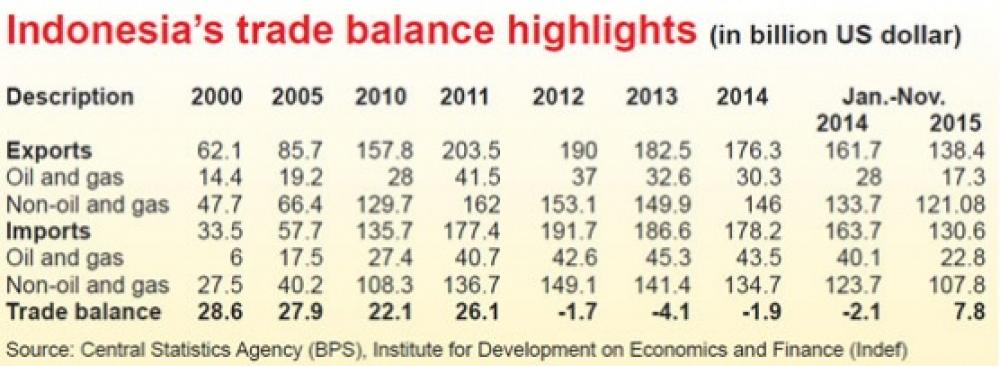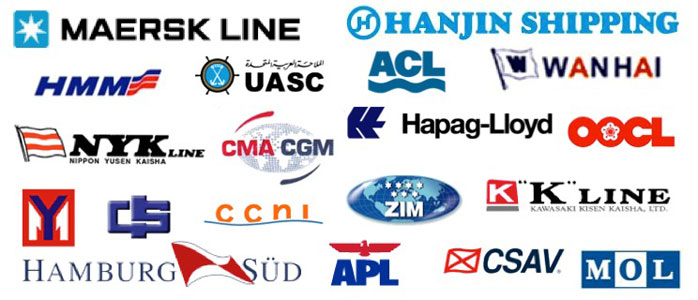A year of mixed seasons for external trade
05 January 2016

A year of mixed seasons for external trade
Marked by a mixed trade performance, the year 2015 has witnessed some major events that will shape the future of Indonesian exports and imports with the rest of the world. A regulatory shake-up, the signing of the ASEAN Community pact and a commitment to join the US-led Trans-Pacific Partnership (TPP) will all affect the country’s bilateral and multilateral trade relations.
The year has seen an anomaly in the country’s trade balance, where it recorded a trade surplus after trade deficits in three consecutive years, but this was due to the sharp decline in imports rather than a surge
in exports.
The country booked a trade surplus of US$7.81 billion in the first 11 months of the year, compared to a $2.1 billion trade deficit during the same period last year.
However, both exports and imports declined, falling by 14.32 percent and 20.24 percent year-on-year (yoy), respectively, amid a fall in commodity prices and weak demand in global and domestic markets due to the economic slowdown.
Indonesia’s export structure still relies heavily on natural resources.
Data from the Central Statistics Agency (BPS) show that the country booked trade surpluses in the early years of the new millennium, supported by a strong global economy and stable commodity prices. The surplus turned into a deficit in the years 2012 to 2014, amid surging oil and gas imports and global economic volatility.
Trade Minister Thomas Lembong, who was appointed in August to replace Rachmat Gobel, said earlier that as world trade grew more slowly than the global gross domestic product (GDP) in two consecutive quarters this year, so did Indonesia’s trade.
Samuel Sekuritas economist Lana Soelistianingsih predicted that exports would remain weak, but that the country would pocket surpluses due to drops in both exports and imports.
“While imports in November surged [by 3.61 percent from October], they will likely continue to fall in December, as Christmas and New Year’s festivities come to a close,” she said.
Exports in all sectors, including oil and gas, agriculture and manufacturing, as well as imports of consumer goods, raw materials and capital goods in the January-November period experienced drops from the same period last year.
Oil and gas posted the steepest fall in exports with a drop of 37.75 percent yoy to $17.34 billion in the first 11 months of this year, largely due to the oil price slump.
On the import side, raw materials saw the sharpest decline, falling 21.39 percent yoy to $98.35 billion in the January-November period.
This year has seen the government move from a protectionist stance to a more open trade policy.
In the middle of the year, a report published by Australian think tank Lowy Institute for International Policy considered Indonesia’s regulations on the local content requirement for smart devices, sales restrictions for alcoholic beverages and beef import caps to be protectionist measures.
In an attempt to boost exports and rationalize imports, the Trade Ministry announced deregulation and de-bureaucratization measures in September as part of the government’s first economic stimulus package.
The ministry is set to revise or revoke as many as 32 regulations comprising 30 ministerial regulations and two other regulations.
While the idea to ease external trade was welcome by both foreign trade partners and local business people, some of the new regulations have sparked controversy.
EU Ambassador to Indonesia and Brunei Darussalam Vincent Guérend said the EU very much welcomed the move, as it would help boost trade relations between the trading bloc and Indonesia.
“Reducing barriers to the flow of trade and investment, upgrading Indonesia’s infrastructure and cutting red tape are exactly the messages EU businesses want to hear,” he said.
The deregulation regarding some ministeral regulations, like the revocation of eco-friendly legal certification on Indonesia’s timber downstream products and loose regulations on tire imports, however, are considered counterproductive by some trading partners and the local tire association.
The year has become a milestone for a number of multilateral economic partnerships.
In November, the heads of ASEAN member states signed a pact to affirm their commitment to implement the ASEAN Community by the turn of the year that covers, among other things, the ASEAN Economic Community (AEC).
The implementation of the AEC will ease the flow of goods, services and people among ASEAN member countries with a commitment to removing tariff and non-tariff barriers.
Separately, Thomas said two very special events in November were the statement of President Joko “Jokowi” Widodo on Indonesia’s intention to join the TPP and the acknowledgement of China’s renminbi as the fifth International Monetary Fund global currency after the US dollar, euro, Japanese yen and British pound.
The TPP has sparked debate among business players and analysts, with some perceiving it as beneficial for Indonesian exports of commodities like textile and footwear, but others considering it a threat for a number of sectors, such as agriculture.
The negotiations on TPP were concluded in October between twelve signatory parties, namely Australia, Brunei Darussalam, Canada, China, Japan, Malaysia, Mexico, New Zealand, Peru, Singapore, US and Vietnam.
Thomas himself previously said that Indonesia would likely be able to join TPP in the next three or four years, with current TPP member countries striving for ratification in their respective countries.
In other trade developments in 2015, Indonesia and the EU committed to continued talks on the Indonesia-EU Comprehensive Economic Partnership Agreement (CEPA), and the World Trade Organization (WTO) at a ministerial meeting in Nairobi, Kenya, reached a global deal on removing export subsidies.





